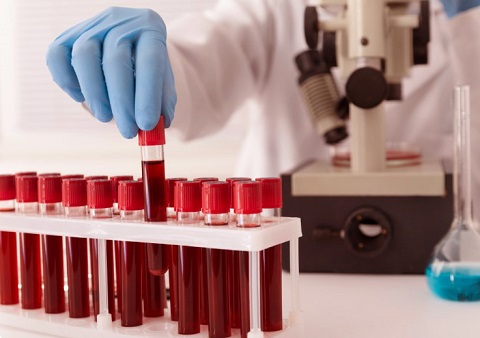Spanish scientists identify plasma proteins that can be used as predictors of COVID-19 disease severity
Nikhil Prasad Fact checked by:Thailand Medical News Team Dec 05, 2024 3 months, 4 weeks, 1 day, 4 hours, 24 minutes ago
Medical News: In a groundbreaking study, researchers from the Spanish National Research Council (CSIC) and collaborators have identified a set of plasma proteins that could revolutionize how we diagnose and manage COVID-19. These proteins, 14 in total, demonstrate strong potential as prognostic markers for predicting disease severity. By leveraging advanced proteomics and machine learning, this study covered in this
Medical News report, sheds light on the complex interaction between SARS-CoV-2 and host cellular mechanisms.
 Spanish scientists identify plasma proteins that can be used as predictors of COVID-19 disease severity
Spanish scientists identify plasma proteins that can be used as predictors of COVID-19 disease severity
The findings open new avenues for personalized medicine, offering the potential for timely intervention and tailored treatment strategies for patients with COVID-19.
Understanding the Study
The study focused on lung epithelial cells engineered to express ACE2, the receptor SARS-CoV-2 uses to enter host cells. Researchers applied Tandem Mass Tag (TMT)-based quantitative proteomics and phosphoproteomics to uncover how the virus reprograms host cells during infection. The team identified 6,802 proteins and 6,428 phosphorylation sites, noting dynamic, time-dependent changes linked to critical cellular processes.
Using machine learning algorithms, the team zeroed in on 29 plasma proteins, out of which 14 showed significant potential as prognostic markers. These proteins were validated in a cohort of 76 COVID-19 patients with varying disease severities, ranging from mild to critical.
How SARS-CoV-2 Reprograms Host Cells
The study revealed that SARS-CoV-2 hijacks host cell machinery, disrupting processes such as:
-Inflammation and Immune Response: Altering pathways to weaken the immune defense.
-Protein Folding and Stress Response: Reprogramming the endoplasmic reticulum for viral protein synthesis.
-Cytoskeletal Dynamics: Compromising structural proteins to facilitate viral replication.
-Cell Cycle Control: Manipulating proteins involved in mitosis and cellular survival.
Among the viral proteins, novel phosphorylation sites were discovered, suggesting mechanisms that enhance viral replication and immune evasion.
The 14 Prognostic Plasma Proteins
The study highlighted 14 plasma proteins with significant correlations to COVID-19 severity. These proteins are involved in critical biological functions such as inflammation, coagulation, immune response, and tissue repair. Below is a detailed look at each protein:
-Alpha-2-Macroglobulin (A2MG): A regulator of inflammation and a marker of acute-phase response, elevated levels were associated with severe COVID-19 cases.
ong>-Clusterin (CLUS): Involved in immune regulation and tissue repair, this protein showed changes linked to disease progression.
-Fibrinogen Alpha Chain (FGA): A key player in blood clotting, its levels increased in severe cases, reflecting hypercoagulable states.
-Fibrinogen Beta Chain (FGB): Another coagulation-related protein, elevated levels correlated with inflammation and clot formation in critical patients.
-Retinol-Binding Protein 4 (RET4): Reflecting metabolic dysregulation, this protein was significantly altered in severe cases.
-Complement Component 5 (CO5): Part of the complement system, its levels were associated with immune overactivation in severe disease.
-Serum Albumin (ALBU): Lower levels were observed in critically ill patients, indicating poor nutritional and inflammatory status.
-Insulin-Like Growth Factor Binding Protein 2 (IBP2): Known for regulating cell growth, its expression was linked to disease severity.
-Heat Shock Protein 70 (HSP70): A stress response protein, its elevated levels reflected cellular stress and damage.
-Serum Amyloid A (SAA): A key inflammatory marker, SAA levels surged in patients with severe inflammation.
-Plasminogen (PLMN): Critical for clot breakdown, its dysregulation was observed in severe COVID-19 cases.
-Complement Component 3 (CO3): Another immune-related protein, CO3 was significantly altered in patients with severe disease.
-Apolipoprotein A1 (APOA1): A marker of lipid metabolism, its reduced levels were linked to inflammation and poor prognosis.
-Haptoglobin (HP): Known for its antioxidant and anti-inflammatory roles, its levels correlated with disease severity and recovery potential.
How These Proteins Predict Severity
The identified proteins play roles in pathways that become dysregulated during severe SARS-CoV-2 infection. For example, proteins involved in inflammation, such as SAA and CO5, highlight the hyperinflammatory state in severe COVID-19.
Similarly, coagulation-related proteins like FGA and FGB indicate the risk of thrombosis, a common complication in critical cases. These biomarkers provide a snapshot of the systemic impact of the virus, allowing clinicians to predict disease trajectory.
Clinical Applications
The identification of these 14 proteins has profound implications for COVID-19 management:
-Early Detection: Measuring these biomarkers in plasma can help identify high-risk patients early in the disease course.
-Stratification of Patients: By correlating protein levels with disease severity, clinicians can categorize patients into risk groups, enabling targeted care.
-Monitoring Treatment Efficacy: Tracking changes in protein levels over time can guide therapeutic interventions and monitor recovery.
-Personalized Therapy: Insights into the pathways these proteins regulate can inform the development of targeted therapies.
Conclusions
This study underscores the transformative potential of proteomics in understanding complex diseases like COVID-19. By identifying 14 plasma proteins as prognostic markers, the research provides a powerful tool for clinicians to predict disease severity, improve patient outcomes, and optimize resource allocation in healthcare systems.
The findings also highlight the intricate interplay between SARS-CoV-2 and host cellular processes, offering new insights into viral pathogenesis. As proteomics research advances, the hope is to extend these discoveries to other infectious diseases, paving the way for a new era in personalized medicine.
The study findings were published in the peer-reviewed Journal of Proteome Research.
https://pubs.acs.org/doi/10.1021/acs.jproteome.4c00566
For the latest COVID-19 News, keep on logging to Thailand Medical News.
Read Also:
https://www.thailandmedical.news/news/transgelin-emerging-as-a-key-biomarker-for-covid-19-severity
https://www.thailandmedical.news/news/lactate-to-albumin-ratio-a-new-prognostic-tool-in-severe-covid-19-cases
